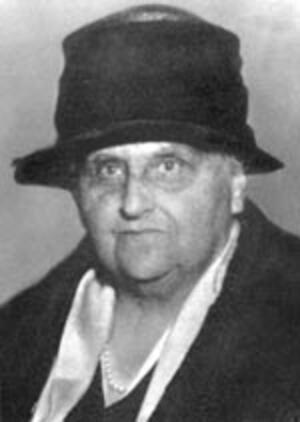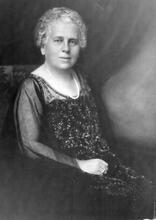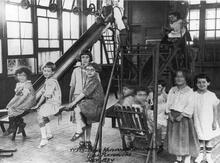Therese Loeb Schiff
Therese Schiff epitomized the intellectual, religious, and philanthropic activities of upper-middle-class German Jewish American women during the late 19th and early 20th centuries.
Institution: The Jacob Rader Marcus Center of the American Jewish Archives, Cincinnati, OH, www.americanjewisharchives.org
Therese Loeb Schiff used her wealth to address a wide range of needs in the American Jewish community, from organizing a literary series for the wealthy to stopping sex trafficking of young immigrant women. Schiff married Jacob Schiff in 1875, and he became a full partner in her father’s investment firm. During his lifetime, Schiff’s husband annually donated ten percent of his wealth to charity, and after his death, Schiff made contributions of her own. She made generous donations to the National Council of Jewish Women to help stop prostitution and to the United Jewish Campaign, among others. Schiff lectured on behalf of the Consumers League to end child labor, and served on the advisory board of the Sisterhood of Personal Service at Temple Eman-El.
Among her diverse activities, Therese Loeb Schiff organized a literary series for wealthy German Jewish women, donated ten thousand dollars to the National Council of Jewish Women to help cope with Jewish prostitution among young immigrant women, and lectured for the Consumers League in support of protective legislation to end child labor and the exploitation of women. Schiff was a paradigm of the intellectual, religious, and cultural activities and also the social service and even political endeavors of upper-middle-class German Jewish women during the late nineteenth and early twentieth centuries.
Family and Marriage
Schiff’s father, Solomon Loeb, emigrated from Worms, Germany, after the 1848 revolution and settled in Cincinnati, where he joined a relative in the clothing firm Kuhn, Netter. Loeb married Fanny Kuhn, the sister of his cousin Abraham, and became a partner in the firm, which was renamed Kuhn, Loeb. On November 6, 1854, Fanny Loeb gave birth to Therese, Solomon’s oldest child. Fanny died while giving birth to her second child, and in 1860 Solomon traveled to Germany, where he married Betty Gallenberg. Betty raised Therese as her own daughter, and she and Solomon had four children of their own: Morris, Guta, James, and Nina. At Betty’s urging, in 1867 Solomon Loeb moved the firm to New York, where the family became part of the elite group of German Jewish financiers known among themselves as “Our Crowd.”
In 1873, Therese met Jacob Schiff. Schiff, born in 1847 in Frankfurt, Germany, had immigrated to the United States at the age of eighteen and had become a successful financier. Kuhn, Loeb had recently invited Schiff to join the firm, and with Betty Loeb’s encouragement he had become a frequent guest at the Loeb home. In 1875, he and Therese were married. Jacob and Therese’s first child, Frieda, was born in 1876, and their son, Mortimer, was born a year later.
After his eldest daughter’s wedding, Solomon Loeb gave his son-in-law, Jacob, a full partnership in Kuhn, Loeb. Schiff and Loeb had very different strategies for investment, and Therese Schiff was often caught in the middle of their arguments. Schiff prevailed, however, and within ten years had taken over as president of the firm. Under Schiff’s leadership, Kuhn, Loeb prospered. It became one of the most powerful investment houses in the United States, and Schiff one of the most influential Jewish men of his generation.
Religion and Philanthropy
Therese Schiff was raised in an agnostic household, and Jacob Schiff was an Orthodox Jew who prayed daily and would not conduct business on the Sabbath. Nevertheless, like most of the other members of their set, they were actively involved in American Reform Judaism and were members of Temple Emanu-El in New York. In 1890, on the occasion of their daughter Frieda’s confirmation, the Schiffs donated to the synagogue a set of Torah she-bi-khetav: Lit. "the written Torah." The Bible; the Pentateuch; Tanakh (the Pentateuch, Prophets and Hagiographia)Torah ornaments decorated with an American flag and an American eagle—a symbol of their commitment to American Jewry and the United States.
As a devout Jew, Jacob Schiff donated ten percent of his income to charity. Jacob’s funds enabled Therese to become involved in the many volunteer and philanthropic activities that characterized the lives of upper-middle-class German Jewish women. By the late 1880s, the German Jewish community in New York was financially very comfortable and used its wealth to build Jewish institutions and establish organizations to help the newly arriving and less fortunate Eastern European immigrants. Freed by servants of domestic responsibilities, these Jewish women took upon themselves the task of creating and staffing the new organizations, which were often funded by their husbands’ money. Jewish women in the late nineteenth and early twentieth centuries, for the most part, conformed to expectations that they would marry and raise families. Volunteerism and philanthropy offered them an opportunity to act beyond their homes in a way that did not contradict their gender-defined roles.
During his lifetime, Jacob Schiff directed much of his wife’s philanthropic activity. After Jacob’s death in 1920, Therese Schiff became more independent and continued her philanthropy on her own, often as leader or participant. Schiff gave three hundred thousand dollars to the Henry Street Settlement as a memorial to her husband, whose funds had allowed Lillian Wald to open the settlement house in 1895.
Schiff was particularly involved with the Emanuel Sisterhood Of Personal Service of which she was an honorary vice president and a member of the advisory board. In 1926, when she was the honorary chair of the women’s division, she donated thirty thousand dollars to the United Jewish Campaign. Schiff also made generous donations to other Jewish charities and organizations including the Montefiore Hospital for Chronic Diseases, the Loeb Convalescent Home, and the YMHA. In 1931, in memory of her son, Mortimer, who had died while he was national chairman of the Boy Scouts of America, Schiff gave money to that organization to purchase land for a national training center.
Later Life
Therese Loeb Schiff died of a cerebral thrombosis on February 26, 1933, at her home on Fifth Avenue. She was remembered for her personal dedication and charitable contributions as “a mother in Israel.” In 1874, Jacob Schiff had written to reassure his mother that his future bride was neither uncultured nor a feminist like other American women but could have been raised in the best of German families.
Schiff undoubtedly would not have characterized herself as a “feminist” either, yet her activities demonstrated a commitment and concern not only for the Jewish people and the less fortunate in general, but for the intellectual and personal well-being of American Jewish women in particular.
Adler, Cyrus. Jacob H. Schiff: His Life and Letters. Vol. 1 (1929).
AJYB 35:128.
Baum, Charlotte, Paula Hyman, and Sonya Michel. The Jewish Woman in America (1976).
Berrol, Selma. “Class or Ethnicity: The Americanized German Jewish Woman and Her Middle Class Sisters in 1895.” Jewish Social Studies 47, no. 1 (1985): 21–31.
Birmingham, Stephen. Our Crowd (1967).
Chernow, Ron. The Warburgs: The Twentieth-Century Odyssey of a Remarkable Jewish Family (1993).
EJ.
Kuzmack, Linda Gordon. Woman’s Cause: The Jewish Women’s Movement in England and the United States (1990).
NYTimes, February 26, 1933, 20:3, and February 27, 1933, 15:1, and February 28, 1933, 20:5.
Slesin, Susan. “Tiffany Glass to Torah Pointers: Looking Beyond the Surface.” NYTimes, October 21, 1993, C1.
Sochen, June. Consecrate Every Day: The Public Lives of Jewish American Women, 1880–1980 (1981).
Sorel, Nancy Caldwell. “Kuhn, Loeb Calls on the House of Morgan.” Forbes (October 27, 1986), 64.
Supple, Barry E. “A Business Elite: German Jewish Financiers in Nineteenth-Century New York.” In The American Jewish Experience, edited by Jonathan D. Sarna (1997).





